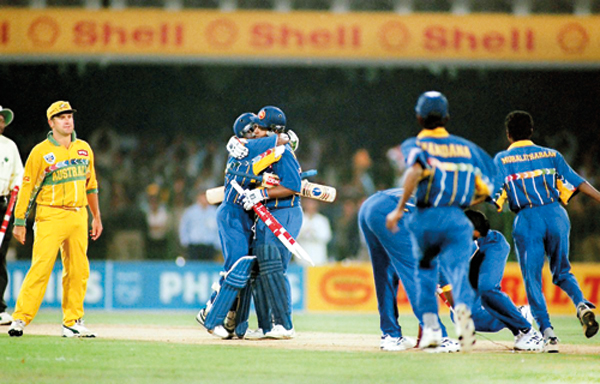Cricket and Teamwork…

Sri Lanka's best achievement in cricket - when Arjuna Ranatunga led Sri Lanka against Mark Taylor's Australians to win the ICC Cricket Wolrd Cup 1996 in Lahore
The game of cricket, having set its roots in this beautiful land over 150 years ago, has become one of the most, if not the most popular and certainly, the most developed sport in the country today. Small wonder, as its inhabitants love the game passionately and are obsessive followers of the game, especially, where the Sri Lankan team is involved.
Cricket is also a great unifier, which brings all Sri Lankans together. People of all walks of life and communities flock into the grounds or sit before a Giant screen, to lustily cheer the National team, while displaying great camaraderie, their only wish being victory for Sri Lanka!
In Sri Lanka, the public interest in the game was further galvanised with our Cricket World Cup victory in 1996 which added a new dimension to Sri Lankan Cricket. This victory brought Pride to our disturbed country, along with the tag of ‘World Champions! The cavalier, attractive style of our cricketers also helped to swell the crowds.
Although individual brilliance does matter in cricket, as in other sports, it needs well-coordinated teamwork to be successful. The greatest feats of Sri Lankan cricket were achieved in 1996 and 2014 when Sri Lanka won two world championships. Both teams had many things in common. They had an abundance of talent coupled with years of experience of playing together, good leadership, captains with differing but effective styles and they had that ‘killer instinct’, desperately wanting to win.
Since the team dynamics of the 1996 team have already been elaborated, using ‘Tuckmans’ teamwork model, in one of my previous articles, I will only be highlighting the aspect of Teamwork of the T20 winners in 2014. Having reached the finals twice, Sri Lanka’s 20/20 side obviously, did not want to be runners-up for the 3rd time, and win they did, becoming the 3rd sub-continent team to win 2 world championships in 2 different formats of the game.
The winning 2014 T20 Sri Lankan team can be tested for its team dynamics using GRPI model. This framework outlines the factors required for effective functioning of Teams. GRPI is the acronym which describes the multiple components of the model.
The team had a common Goal – to win the world T20 championship. This Goal was clear to every individual in the team, with every one of them fully committed to achieving this goal. This was the foundation for good teamwork. The team was well bonded and highly focussed to win the Cup. A high level of output and quality was expected from all members. This coterie of professional cricketers had always been setting high standards for themselves.
Each member has a defined Role to play. The Sri Lanka captain had to be changed due to his suspension for slow over rate against England, and was replaced by the Vice captain on tour to lead the side. The new captain played a major role and was well supported by the two cricketing greats who were playing their last T20 game for the country. They both used their experience and their contributions, both in input and performance, along with the skipper’s contribution, saw Sri Lanka beating the formidable Indian outfit in Bangladesh. On the way to the finals, every member played his assigned role to the best of his ability. All the Batters were among the runs, while all the Bowlers grabbed wickets.
The team was high in spirits, fresh after their Asia Cup victory in Bangladesh, a few weeks back. It was seen that most of the decisions, if not all, were made collectively, at the finals. This decision making process would have encouraged insights from all, making the skipper’s job that much easier. They always had the best team composition, with the right combination of skills for every game played.
This side had 6-7 senior players with a wealth of experience. They had been playing together for at least over 5 years and had developed excellent Inter Personal Relationships. In the process, they would have built trust among themselves which must have spilled over to the other members as well. Trust is a vital component for team effectiveness. The skipper could trust these players for their commitment and execution. This resulted in excellent cooperation among the members which is a key benefit of Teamwork.
The environment created throughout the tour was also conducive to sustaining effective teamwork. The T20 world champion Sri Lankan Team has proven that it followed the GRPI model of team dynamics. That it’s 4 components –Goal, Role, Process and Inter Personal Relationships were effectively used, is amply evident.


